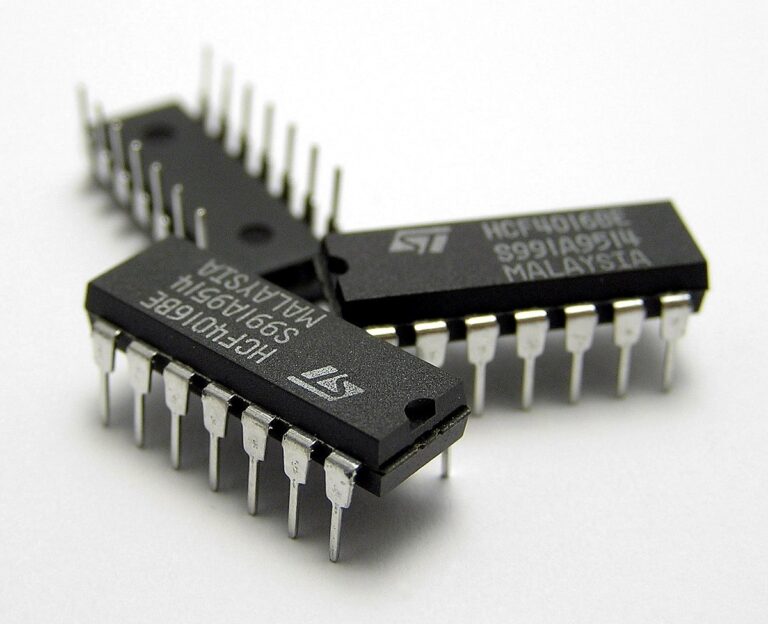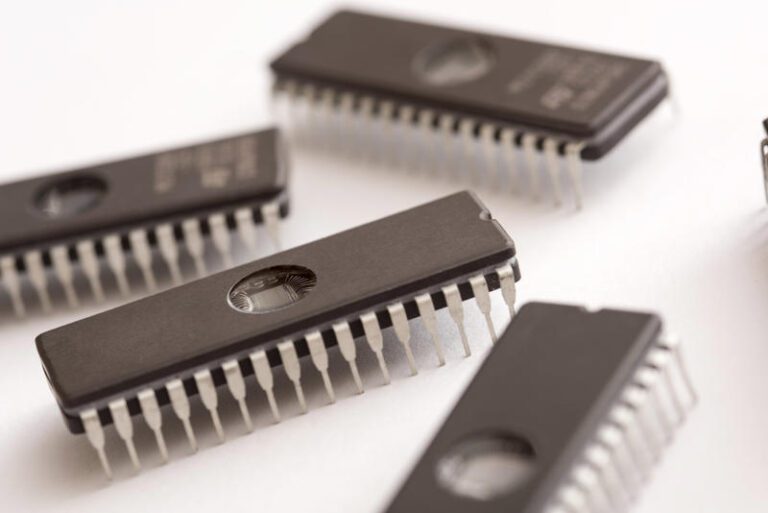Integrated Circuits (ICs)

More from the Category
Integrated Circuits (ICs) are miniaturized electronic circuits composed of interconnected electronic components, such as transistors, diodes, and resistors, fabricated on a single semiconductor wafer or chip. They are the fundamental building blocks of modern electronic devices, enabling the integration of complex circuitry in a compact and efficient manner.

Three IC circuit chips (Image source: Wikimedia Commons)
Advantages of ICs over discrete components:
- Size and weight reduction: ICs enable the consolidation of multiple components into a single chip, reducing the size and weight of electronic devices.
- Improved performance: Integration allows for shorter interconnection paths, leading to faster signal propagation and improved overall performance.
- Reliability: ICs offer improved reliability due to reduced interconnection points and enhanced manufacturing processes.
- Power efficiency: Integrated circuits consume less power compared to discrete components, leading to improved energy efficiency.
- Cost-effectiveness: Mass production of ICs results in lower production costs per unit, making electronics more affordable for consumers.
A Brief History of ICs
The development of ICs has evolved over several decades, driven by advancements in semiconductor technology and the visionary work of numerous scientists and engineers.
Early developments and pioneers:
- In the late 1940s and early 1950s, researchers such as William Shockley, John Bardeen, and Walter Brattain at Bell Labs invented the transistor, a key component for integrated circuits.
- In 1958, Jack Kilby of Texas Instruments demonstrated the first working IC, integrating several components on a single chip.
- Robert Noyce of Fairchild Semiconductor and Jean Hoerni of the Planar Process Corporation independently invented the planar process, a technique that revolutionized IC manufacturing.
Milestones and advancements:
- The 1960s witnessed the introduction of small-scale integration (SSI) and medium-scale integration (MSI) ICs, enabling the integration of tens to hundreds of components on a single chip.
- The 1970s saw the emergence of large-scale integration (LSI) and very large-scale integration (VLSI) ICs, with the ability to integrate thousands to millions of components on a chip.
- The 1980s and 1990s marked the era of ultra-large-scale integration (ULSI) ICs, enabling the integration of millions to billions of components on a chip.
- Advances in lithography techniques, materials, and design methodologies have continuously pushed the boundaries of IC miniaturization and performance.
Types of Integrated Circuits
Integrated circuits can be classified into several types based on their functionality and applications:
Digital ICs:
Digital ICs process digital signals and perform functions such as logic operations, data storage, and arithmetic operations.
Examples include: logic gates, microcontrollers, digital signal processors (DSPs), and field-programmable gate arrays (FPGAs).
Analog ICs:
Analog ICs handle continuous analog signals, processing functions such as amplification, filtering, and modulation/demodulation.
Examples include: operational amplifiers (op-amps), voltage regulators, audio amplifiers, and analog-to-digital converters (ADCs) and digital-to-analog converters (DACs).
Mixed-signal ICs:
Mixed-signal ICs integrate both analog and digital circuitry on a single chip, allowing for seamless interaction between analog and digital components.
Examples include: analog-to-digital converters (ADCs) with built-in microcontrollers, and application-specific integrated circuits (ASICs) that combine analog and digital functions.
Memory ICs:
Memory ICs store and retrieve digital data.
Examples include: read-only memory (ROM), random-access memory (RAM), flash memory, and erasable programmable read-only memory (EPROM) or electrically erasable programmable read-only memory (EEPROM).
Microprocessors:
Microprocessors are ICs designed as the central processing units (CPUs) of computers and other digital devices.
They incorporate the functions of a digital IC, controlling and executing instructions and data processing.
IC Design and Manufacturing
IC design and manufacturing involve a multi-step process, including:
IC design process:
- Specification: Defining the requirements and functionality of the IC.
- Circuit design: Creating the circuit diagram and optimizing the circuitry for desired performance.
- Layout design: Determining the physical arrangement of components on the chip and designing interconnections.
- Verification and testing: Simulating and testing the design to ensure functionality and performance.
Semiconductor materials:
- Silicon is the most commonly used material for IC fabrication due to its abundance and desirable semiconductor properties.
- Other materials like gallium arsenide (GaAs) and indium phosphide (InP) are used for specialized applications that require high-speed or high-frequency performance.
Fabrication techniques:
- The fabrication process involves multiple steps, including wafer preparation, photolithography, etching, deposition, and packaging.
- Photolithography is a crucial step that uses light and masks to transfer the circuit pattern onto the wafer.
- Etching selectively removes material to create the desired circuit structure.
- Deposition adds layers of material to form the necessary components and interconnections.
Applications of ICs
Integrated circuits find applications in various industries and electronic devices:
Consumer electronics:
Power smartphones, tablets, laptops, televisions, gaming consoles, and smart home devices, enhancing connectivity, processing capabilities, and energy efficiency.
Telecommunications:
ICs enable communication systems, including mobile phones, base stations, routers, and satellite communication, providing reliable and efficient connectivity.
Medical devices:
ICs are used in medical imaging equipment, pacemakers, hearing aids, insulin pumps, and diagnostic devices, improving accuracy, miniaturization, and power efficiency.
Automotive industry:
ICs play a vital role in automotive systems such as engine control units (ECUs), anti-lock braking systems (ABS), infotainment systems, and advanced driver-assistance systems (ADAS), enhancing safety, performance, and connectivity in vehicles.
Aerospace and defense:
They are essential components in aerospace systems, including navigation systems, satellite communication, radar systems, and guidance systems, enabling advanced functionalities and reliability.
Lorem ipsum dolor sit amet, consectetur adipiscing elit. Ut elit tellus, luctus nec ullamcorper mattis, pulvinar dapibus leo.
Future Trends in IC Technology
The field of IC technology continues to evolve, driven by emerging trends and demands for more advanced and efficient electronics:
Moore’s Law and its Impact:
- Moore’s Law states that the number of transistors on a chip doubles approximately every two years, and has been a driving force behind IC miniaturization and performance improvements.
- However, as transistor sizes approach physical limitations, alternative technologies like nanoelectronics, quantum computing, and neuromorphic computing are being explored.
System-on-Chip (SoC) integration:
- SoC integration involves combining multiple functions, such as processing, memory, and connectivity, into a single chip, reducing power consumption, footprint, and cost while improving performance.
Internet of Things (IoT) and ICs:
- The proliferation of IoT devices demands low-power, small-sized ICs with integrated sensing, wireless connectivity, and processing capabilities to enable seamless connectivity and data processing.
Quantum computing and ICs:
- Quantum computing, utilizing the principles of quantum mechanics, has the potential to revolutionize computing power and solve complex problems. ICs play a crucial role in controlling and manipulating qubits in quantum computers.
Challenges and Limitations
While ICs have brought tremendous advancements, several challenges and limitations persist:
Heat dissipation and power consumption:
As ICs become smaller and more powerful, managing heat dissipation and reducing power consumption become critical to prevent overheating and ensure energy efficiency.
Shrinking transistor sizes:
Shrinking transistor sizes face physical limitations, including quantum effects and leakage currents, requiring innovative solutions such as new materials, alternative device structures, and nanoscale technologies.
Security concerns and countermeasures:
The increasing complexity and connectivity of ICs raise concerns about security vulnerabilities, including hardware-based attacks and data breaches. Robust security measures and hardware-level protections are essential.

Integrated circuit memory chips. (Image source: gratuit)
Conclusion
Integrated Circuits (ICs) have transformed the world of electronics, enabling compact, efficient, and powerful electronic devices across various industries. From consumer electronics to telecommunications, automotive systems to medical devices, ICs have revolutionized technology and impacted society.
Understanding the history, types, design, and applications of ICs provides insights into their immense potential and challenges. As IC technology continues to evolve, future trends like SoC integration, IoT, and quantum computing will shape the next generation of electronic devices, paving the way for exciting advancements in the digital age.


